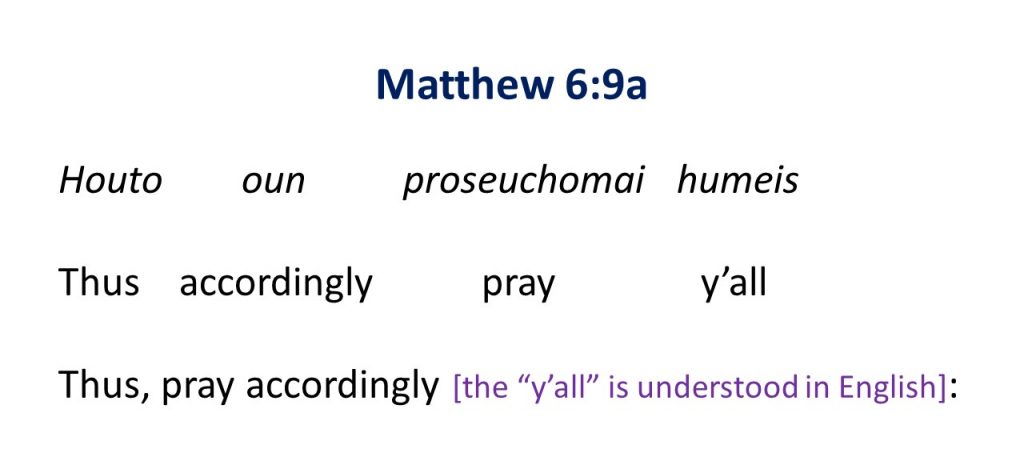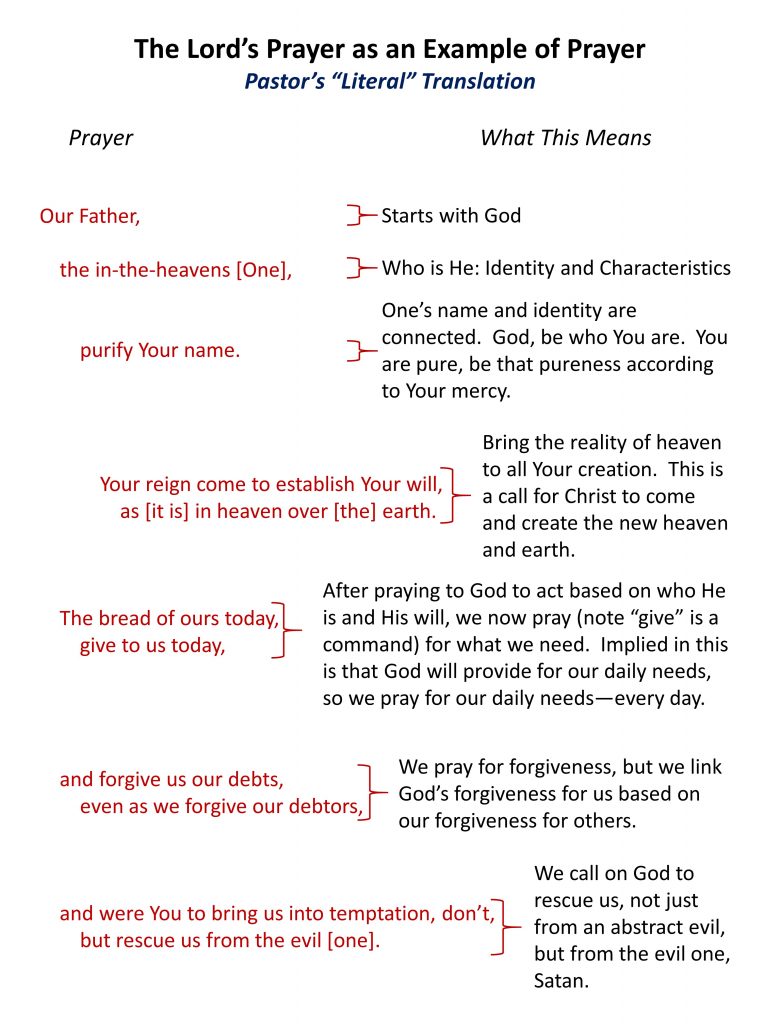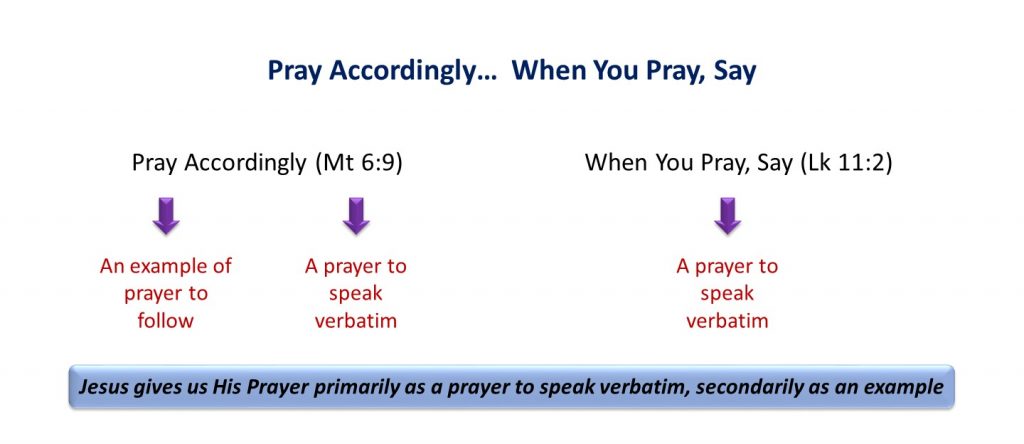 If we want to know about Christian prayer, then we turn to the Christ, who gave us His prayer.
If we want to know about Christian prayer, then we turn to the Christ, who gave us His prayer.
Read Matthew 6:5-6
- When Jesus says, “When you pray,” what does He assume is part of His disciples’ lives?
- What does Jesus NOT want our prayers to become?
Read Matthew 6:7-8
“empty phrases”: Greek, verb, battalogeo (batta = much; logeo = speak), speaking a lot. Battalegeo took on a secondary meaning of babbling because babbling involved many words or sounds. (This could even be a censure against ecstatic speaking, which many Gentiles practiced in their religions.) We inherited the idea of “vain repetition” from this verse from the King James Bible. The Greek text says nothing about vain (or empty) speech or even repetition. Battalogeo is being wordy or “long winded.”
- Why did the Gentiles pray with “much speaking”? (vs. 7)
“many words”: Greek, noun, polulogia (polu = many; logia = word). Here, Jesus uses a synonym of what He just said earlier as a verb, but here, He uses a noun.
- Jesus isn’t against many words, but against using “many words” in our prayers for what purpose?
- Why don’t we have to pray to God using many words? (vs. 8)
- Can such wordiness (not that it automatically does or must) reveal a lack of trust toward God?
- When Jesus says, “Thus, pray [an imperative] accordingly,” what does He mean?
“Accordingly” can be an example but also words to say verbatim. As an example, the structure of the Lord’s Prayer teaches us.
- Is anything lacking for us in the Lord’s Prayer?
What is the Lord’s Prayer?
The Lord’s Prayer is Jesus’ prayer to His heavenly Father. Only Jesus is the one-and-only Son of the Father (John 3:16), so only He alone may approach and address God as Father. Apart from Jesus Christ, we don’t even have the ability (righteousness) to pray to God!
Jesus’ disciples recognized this reality, that apart from Jesus they didn’t even have the ability to pray. “One day Jesus was praying in a certain place. When he finished, one of his disciples said to him, “Lord, teach us to pray…” (Luke 11:1).
So, Jesus shares His sonship with us (Romans 8:14-15, Galatians 4:4-6). This enables us to pray His prayer because He includes us into His prayer to God the Father (Romans 13:14, Galatians 3:26-27).
- By Jesus’ use of “our,” what does that do for us about requiring an intermediary between us and God.
- When Jesus uses “our” what is He also saying about a Christian praying “in secret,” alone? Who is in included in the “our.”
The Lord’s Prayer as a Prayer to Pray Repeatedly
In Luke chapter 2, our Lord’s disciples asked Jesus to teach them to pray. Jesus responded, “When you pray, say: ‘Our Father…’”
Here, Jesus expects His disciples to repeat verbatim the prayer He gave them. “When you pray, say.”
Jesus does not command us to pray. He says, “When you pray.” Jesus assumes prayer to be of part of life for those who are His disciples. But when we do pray, Jesus commands that we “pray” (imperative) accordingly, as He has given us to pray in Matthew 6:6. In Luke 11:2, Jesus commands us to “say” (imperative) the words of the Lord’s Prayer.
Why Pray? “Grace Alone”
Jesus doesn’t command prayer (just like He doesn’t command helping the poor or fasting). So, “Why pray?” The Small Catechism, teaching the Lord’s Prayer has many phrases, such as:
- The kingdom of God comes even without our prayer. But we pray…
- The good and gracious will of God is done indeed without our prayer. But we pray…
- God indeed gives daily bread to everyone, even to the wicked, without our prayers. But we pray…
If God works His will even without our prayers, why bother praying at all? That is a Law question, but the answer is rooted in the Gospel. We explore the book of Romans.
Paul hammered away at salvation by works, whether by trying to follow the Old covenant or whether by trying be righteous before God based on what you do. Then, in Romans 6, Paul says: “What should we say then? Should we go on sinning so that grace may increase?” (Romans 6:1).
The Apostle was fighting for the “grace alone” truth of the Gospel. The same question, however, arises with every part of living the life of faith. “If Christ alone saves, then why should I bother, if it’s all His doing anyway?” This thinking originates from our sinful nature understanding the Gospel but coming to a sinful conclusion. “If faith alone saves, then why should I bother trying to become loving?” “If God does what He does whether I pray or not, why bother praying.”
- When you ask such a question, what is the truth about God behind such a question?
Is getting something from God our only motivation for praying? If so, then it needs to die with the “grace alone” truth of Gospel. Your prayer does not change the heart of God.
- The Lord’s Prayer begins as a recognition of Whom?
Recognizing Who God is and His character, we then call on Him to be Who He is within our context and setting. Faith is content to recognize God as God and rest in His working all things for our eternal good (Romans 8:28).
My motivation to pray is not the fear of what will happen if I don’t, nor the hope of getting something from God. Prayer grows from the joy we have in the Gospel and the mercy of Christ who has chosen to use us, even in our prayers.
Why Pray? Communion not only Communication
“Our Father…”
- Jesus brings us to the Father and makes His prayer our prayer. Being able to pray because of Jesus denotes what about us in relation to the Father?
The “our” in “our Father” shows us to be in communion with God Father through His Son. When we analyze most of our talk, most of it is not about getting something from someone else. Most of our talk is just talk, saying what’s on our mind, sharing our fears, hopes, longings, and sometimes our secrets. Our conversation is not only communication but also communion with another.
The key to prayer is the Gospel. Prayer is a form of Communion brought about by our union with Jesus Christ (Romans 6:3-5), which involves communication with God.
Prayer is holy conversation. It’s children coming to their Father in heaven and saying, Abba, Dad. Prayer is the Son insisting His Father listen to us, as the Spirit is packaging and delivering our words. And in such communication, we, of course, tell God about those who are sick and the other concerns in our lives.




